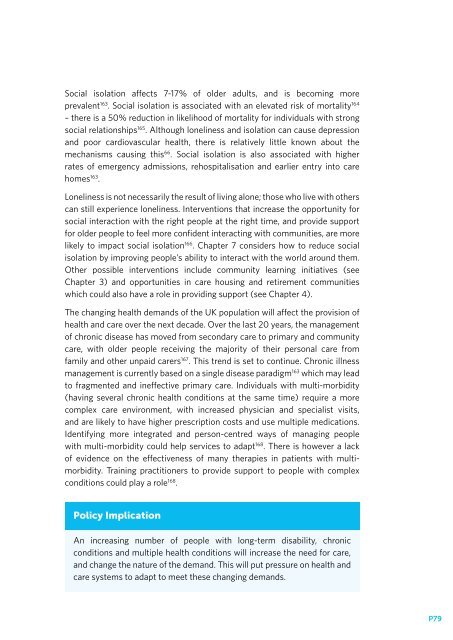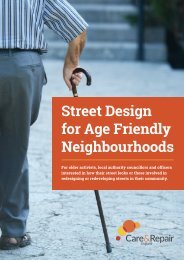Future of an Ageing Population
gs-16-10-future-of-an-ageing-population
gs-16-10-future-of-an-ageing-population
Create successful ePaper yourself
Turn your PDF publications into a flip-book with our unique Google optimized e-Paper software.
Social isolation affects 7-17% <strong>of</strong> older adults, <strong>an</strong>d is becoming more<br />
prevalent 163 . Social isolation is associated with <strong>an</strong> elevated risk <strong>of</strong> mortality 164<br />
– there is a 50% reduction in likelihood <strong>of</strong> mortality for individuals with strong<br />
social relationships 165 . Although loneliness <strong>an</strong>d isolation c<strong>an</strong> cause depression<br />
<strong>an</strong>d poor cardiovascular health, there is relatively little known about the<br />
mech<strong>an</strong>isms causing this 66 . Social isolation is also associated with higher<br />
rates <strong>of</strong> emergency admissions, rehospitalisation <strong>an</strong>d earlier entry into care<br />
homes 163 .<br />
Loneliness is not necessarily the result <strong>of</strong> living alone; those who live with others<br />
c<strong>an</strong> still experience loneliness. Interventions that increase the opportunity for<br />
social interaction with the right people at the right time, <strong>an</strong>d provide support<br />
for older people to feel more confident interacting with communities, are more<br />
likely to impact social isolation 166 . Chapter 7 considers how to reduce social<br />
isolation by improving people’s ability to interact with the world around them.<br />
Other possible interventions include community learning initiatives (see<br />
Chapter 3) <strong>an</strong>d opportunities in care housing <strong>an</strong>d retirement communities<br />
which could also have a role in providing support (see Chapter 4).<br />
The ch<strong>an</strong>ging health dem<strong>an</strong>ds <strong>of</strong> the UK population will affect the provision <strong>of</strong><br />
health <strong>an</strong>d care over the next decade. Over the last 20 years, the m<strong>an</strong>agement<br />
<strong>of</strong> chronic disease has moved from secondary care to primary <strong>an</strong>d community<br />
care, with older people receiving the majority <strong>of</strong> their personal care from<br />
family <strong>an</strong>d other unpaid carers 167 . This trend is set to continue. Chronic illness<br />
m<strong>an</strong>agement is currently based on a single disease paradigm 163 which may lead<br />
to fragmented <strong>an</strong>d ineffective primary care. Individuals with multi-morbidity<br />
(having several chronic health conditions at the same time) require a more<br />
complex care environment, with increased physici<strong>an</strong> <strong>an</strong>d specialist visits,<br />
<strong>an</strong>d are likely to have higher prescription costs <strong>an</strong>d use multiple medications.<br />
Identifying more integrated <strong>an</strong>d person-centred ways <strong>of</strong> m<strong>an</strong>aging people<br />
with multi-morbidity could help services to adapt 168 . There is however a lack<br />
<strong>of</strong> evidence on the effectiveness <strong>of</strong> m<strong>an</strong>y therapies in patients with multimorbidity.<br />
Training practitioners to provide support to people with complex<br />
conditions could play a role 168 .<br />
Policy Implication<br />
An increasing number <strong>of</strong> people with long-term disability, chronic<br />
conditions <strong>an</strong>d multiple health conditions will increase the need for care,<br />
<strong>an</strong>d ch<strong>an</strong>ge the nature <strong>of</strong> the dem<strong>an</strong>d. This will put pressure on health <strong>an</strong>d<br />
care systems to adapt to meet these ch<strong>an</strong>ging dem<strong>an</strong>ds.<br />
P79



